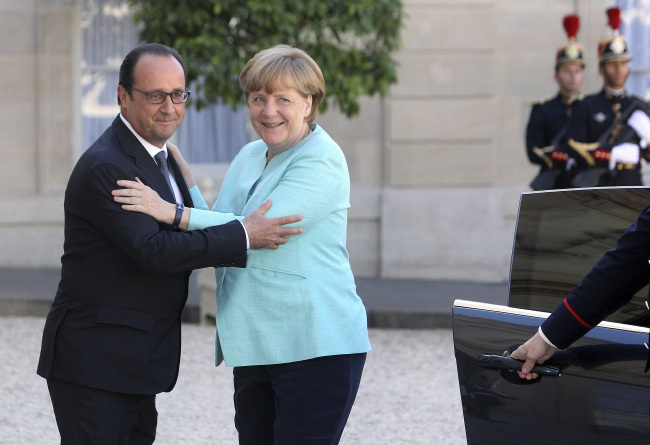 |
France`s President Francois Hollande (left) welcomes German Chancellor Angela Merkel prior to a meeting in Paris on July 6. (AP-Yonhap) |
BRUSSELS (AFP) -- On the frontline of the Greek debt crisis, the Franco-German partnership has been in open conflict with Chancellor Angela Merkel and President Francois Hollande deeply divided over how far to go to keep Greece in the eurozone.
On Monday, Greece reached a desperately-needed bailout deal with the eurozone after marathon overnight talks, in a historic agreement to prevent the country crashing out of the European single currency.
The country‘s leftist Prime Minister Alexis Tsipras agreed to tough reforms after 17 hours of negotiations in return for a three-year bailout worth up to 86 billion euros ($96 billion), Greece’s third rescue program in five years.
After bailout talks ended, Merkel warned that Greece and its European partners still faced a challenging road ahead.
“The road will be long, and judging by the negotiations tonight, difficult,” Merkel told reporters,.
In the midst of the grueling negotiations, Germany clearly envisaged the possibility of a “Grexit” from the single currency, while France wanted to avoid it at all costs.
“There will be no agreement at any price,” Merkel said Sunday at yet another eurozone summit, taking a hard line in the troubled bailout talks.
Merkel pointed to a broad lack of trust in the hard-left government in Athens and warned of “tough negotiations” ahead.
A little later, Hollande dismissed a temporary “Grexit” plan mulled by Germany and presented as an option in a draft document compiled by eurozone finance ministers.
“There is Greece in the eurozone or Greece no longer in the eurozone, but at that point it becomes a Europe that is retreating and I do not want that,” he said, reiterating that France would do “everything” to reach a deal to keep Greece in the euro.
The gap between Hollande and Merkel has widened since the surprise announcement by the Greek Prime Minister Alexis Tsipras to hold a referendum on July 5, which resulted in Greek voters firmly rejecting creditors‘ demands for more austerity.
Germany has since taken a tougher stance in the negotiations with Athens on the country’s bid for a new rescue package.
The discord seemed to have developed into a pattern as Merkel focuses on demanding that Greece respect eurozone rules and Hollande calls for compromise and European “solidarity,” while both pursue the goal of reaching an agreement.
Domestically, Hollande and Merkel face different political circumstances.
The unpopular Hollande has sought to lead efforts to resolve the Greek crisis in order to burnish his political credentials two years before his term in office ends.
But in the last two weeks he has come under fire from not only his opposition who accuse him of having France break with Germany, but also from the radical left, who reproach him for yielding to Berlin.
Former French Prime Minister Francois Fillon accused Hollande of having “played the troublemaker: Rigorous in the company of Angela Merkel, but indulgent behind the scenes with Alexis Tsipras” in a bid to eclipse his “own economic, social and financial failures.”
“We need Hollande to get his act together and restore unity with German Chancellor (Angela) Merkel” said former president Nicolas Sarkozy, also in Brussels for a meeting of the center-right European People‘s Party.
He accused his successor and rival of having dangled “a check without conditions” before Tsipras.
The gap has also widened between Hollande’s French Socialists and the Social Democratic Party of Germany, whose leader and German Vice Chancellor Sigmar Gabriel has stepped up his criticism of Athens.
Unlike Hollande, the risks at home are limited for Merkel, who faces pressure to stay firm on Greece and was described as the “Iron Chancellor” on Tuesday by tabloid newspaper Bild Zeitung.
Triumphantly reelected in September 2013 for a third term, the chancellor has to contend with the hardline conservatives in her camp, but so far they have always ended up falling in line.








![[Today’s K-pop] Blackpink’s Jennie, Lisa invited to Coachella as solo acts](http://res.heraldm.com/phpwas/restmb_idxmake.php?idx=644&simg=/content/image/2024/11/21/20241121050099_0.jpg)